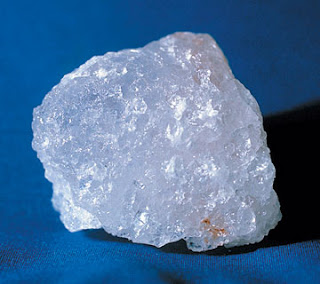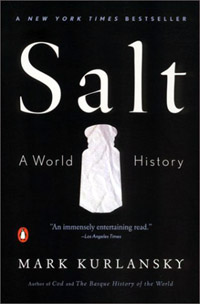After hearing today’s readings at Mass, I wanted to share a favorite non-fiction book with you all. For those who don’t attend Mass, today’s gospel reading was from Matthew 5:13-16:
Jesus said to his disciples:
“You are the salt of the earth. But if salt loses its taste, with what can it be seasoned? It is no longer good for anything but to be thrown out and trampled underfoot.
You are the light of the world. A city set on a mountain cannot be hidden. Nor do they light a lamp and then put it under a bushel basket; it is set on a lampstand, where it gives light to all in the house.
Just so, your light must shine before others, that they may see your good deeds and glorify your heavenly Father.”
The priest gave a homily focused on the history of salt: the way it acts as a preservative, enriches other flavors, and is the origin of the word salary (soldiers of the ancient world were sometimes paid in salt). I was delighted because it sounded like the priest was drawing his examples from a book I love: Salt by Mark Kurlansky.
Ok. So the book is pretty much exactly what it sounds like, and I’m not sure how much explanation from me is necessary. It’s a world tour using salt as a lens for history, so you get plenty of history of travel (trade routes, ability to preserve food for journeys), business history and culture (varieties of salt and the ways they gained sway, regulation/patent history/iodization), and culinary history (salted rotted fish juice served by the Romans turns out to be the precursor to ketchup — who knew!).
Not to mention history of folklore! The story of the Daughter Who Loved Her Father Like Salt is incredibly common across cultures. (So common, in fact, that you can page through a compendium of these stories created by the University of Pittsburgh). The stories come from a variety of disparate cultures, and I’m not sure how independent these cultures were when the stories were first told.
I’ve heard it argued in the past that when stories are common across cultures, they reflect important truths or lessons — here, obviously, the importance of salt and (depending on the retelling) the virtue of humble things. I’ve heard people make the same case that the variety of god(s) across cultures points to the truth of God’s existence, even if the substance of the story has gotten muddled along the way. C.S. Lewis expands on this idea in The Last Battle (the final Narnia book) when a Calormene boy meets Aslan (the Christ-figure), even though he was seeking Tash, the cruel god of Calormen. Aslan tells him:
I take to me the services which thou hast done to him. For I and he are of such different kinds that no service which is vile can be done to me, and none which is not vile can be done to him. Therefore if any man swear by Tash and keep his oath for the oath’s sake, it is by me that he has truly sworn, though he know it not, and it is I who reward him. And if any man do a cruelty in my name, then, though he says the name Aslan, it is Tash whom he serves and by Tash his deed is accepted
To my mind, the various tales of God(s) across cultures are less like the story of the salt-loving daughter and more like the crones who appear in some variants and drive plots with their sorcery. Most literally, these variant gods serve as deus ex machina that resolve stories by drawing on powers and knowledge beyond those of the protagonist. They also validate the ending, since the involvement of a divine being is a guarantor that justice is truly being served (think of Athena intervening at the end of the Oresteia). Gods and witches are too useful to the crafting of plot for me to assume they reflect a truth external to it.
I don’t see compelling evidence in the cultural histories of various gods (particularly when they diverge so much from the God I’m being pitched in the present day), but I wonder if any of the commenters feel differently? Or if there are hypothetical cultural similarities you would find persuasive?
P.S. On a less scholarly note, I don’t know if I’m unique in liking my chocolate chip cookies salty, but in case anyone shares my tastes The New York Times once ran a sea-salt chocolate chip cookie recipe as part of an investigation into ideal cookies. Enjoy, but start now! The taste testers found that the cookies were best when the dough was rested for 36 hours before baking.














